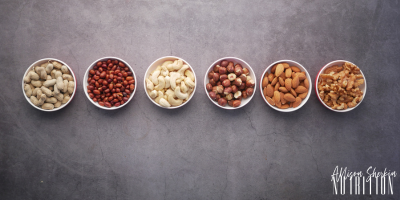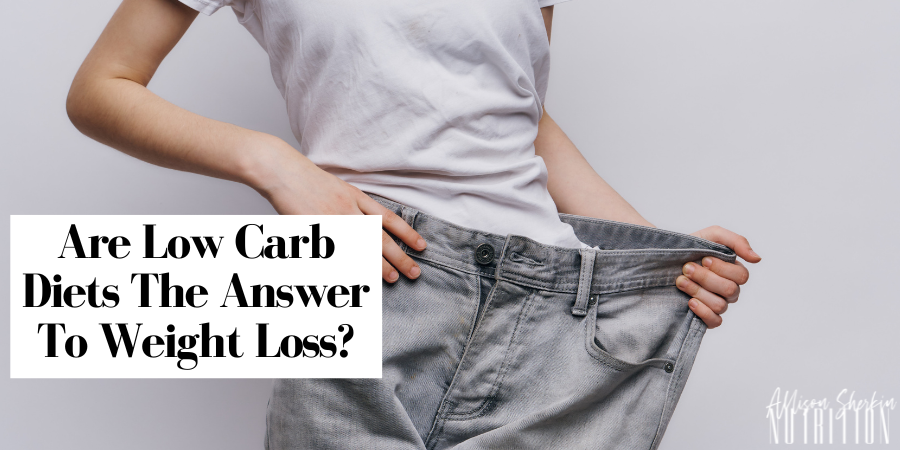Low Carb Diets and Weight Loss
Lowering carbohydrate intake has definitely been a topic of controversy over the last decade. Many have thought to turn towards a lower carb diet to lose weight & reduce body fat, regain energy levels, and balance blood sugar.
Today, I am hoping to help navigate making a decision around choosing to lower your carbohydrate intake, and if this is the best option specific to weight loss. Though reducing carb intake may cause the scale to drop initially, there may be negative and unwanted side effects. Before hopping on the low carb bandwagon, decide whether this dietary choice is sustainable long term.
What to consider before squashing Carbohydrates:
Your Energy May Suffer

Carbohydrates are the body’s main source of energy. Some of the healthiest foods on the planet contain moderate to high levels of carbohydrates like oats and fruits! Though these foods have a higher carbohydrate content, they nourish the body and provide us with energy and nutrients.
Most health experts suggest getting around 50% of our daily calories from carbohydrates. According to the Institute of Medicine of the National Academy of Sciences, the human brain requires 130 grams of carbohydrate a day to function optimally—and that’s a minimum. Many of us don’t feel as energized when slashing our carb intake. It is important to recognize whether or not you are feeling tired while trying this.
When carbohydrates fall below threshold, the body begins burning fat for fuel instead of glycogen (stored carbohydrates). This is the same response we would see from someone following the ketogenic diet. This process produces ketones in the blood, which may not be favourable. For some, ketones cause constipation, nausea, lack of concentration, and fatigue (keto flu).
You May Consume Too Much Fat

Lower carbohydrate diets typically encourage a higher protein and fat intake. Many people that decide to go low carb, compensate by going overboard on their fat intake to stay full and satisfied. When the famous Atkins low carb diet came out, it allowed up to 26 percent of daily calories from saturated fat. People were now on a “fat diet” and consuming as much butter, and bacon as they wanted.
Many health experts suggest over 10 percent of saturated fat daily can negatively impact health. The risk of many chronic conditions like heart disease, begin to rise. Once you start limiting and avoiding carbohydrates like pasta, fruits, and beans, it becomes hard to avoid too many fatty animal foods.
Ask yourself if cutting out this food group will allow you enough options to feel full and satisfied? If you do decide to cut your carbohydrate intake, be sure to carefully monitor how much fat you are consuming, and what kinds of fat. Go for unsaturated fats like nuts and seeds, avocado, and good quality oils.
You May Experience Poor Digestion

Foods like whole grains, fruits, vegetables, and beans contain tons of fiber. Getting adequate fiber daily is crucial for a strong and healthy digestive system. Fiber is responsible for cleaning out the buildup within the intestinal tract and avoiding constipation.
Many individuals that go low carb, or completely avoid carbs, suffer tremendously with passing regular bowel movements. They also seem to experience more indigestion, bloating, and abdominal pain. This is likely due to the lack of fiber, and large amounts of protein.
Additionally, fiber is responsible for feeding and diversifying our gut microbiome, and we are only as healthy as our pipes! Many fibers are referred to as prebiotics – which means they are fermented in the colon by our healthy gut bacteria.
The products of this fermentation process are short chain fatty acids. These helps keep the colon lining healthy. This fermentation process also kills of the harmful bacteria within the colon responsible for illness and disease. This is why fiber can also reduce your risk of colon cancer.
You May Miss Out
Health is about more than just what we eat, it is about feeling good both mentally and physically. If you are familiar with my holistic practice, you may have heard my philosophy around the mind, body connection.
Many people that choose to limit their carbohydrate intake struggle to find enjoyment in their meals. Eating around friends and family may become a challenge, and some begin to build an unhealthy relationship with food, specifically carbohydrates. This can cause an increase in stress levels, which in turn, can lead to weight gain! Finding a balance is usually the best approach to keep both the body, and mind healthy and happy.
Not sure what the best dietary intervention is for you? Feel free to reach out and book a free initial assessment Here!
Frequently Asked Questions:
How many grams of carbohydrate do I have on a low carb diet?
Typically, those on a lower carbohydrate diet consume between 25-50 grams of carbohydrate daily. This allows their body to enter a state on ketosis, in which they are burning fuel instead of glucose for energy.
Is it safe to follow a low carb diet long term?
There is limited research on the long-term effects of low carb diets. It is important to be monitored by a health professional to ensure you are getting in the necessary nutrients for health.
Can a low carb diet help with hormonal imbalance in middle-aged women?
A diet lower in carbohydrate may help balance hormones in women. It can help with regulating blood sugar levels, and reduce insulin resistance which can directly impact a woman’s hormonal harmony.
Will a low carb diet reduce belly fat?
It can! Eating fewer carbohydrates can help balance blood sugar levels, and lower insulin. This can lead to less visceral fat (fat around the belly and vital organs).
How long should I follow a low carb diet for weight loss?
This is very different depending on individual needs. The length of time varies based on weight loss goals. Some people follow a low carb diet for several months, while others make it a long-term lifestyle change. It is important to work with a healthcare professional to determine the appropriate length for you.
What are some foods to focus on that are low carb?
Lower carbohydrate foods to focus on include non-starchy vegetables, nuts, seeds, meat, fish, poultry, seafood, avocado, olives, and olive oil.

Written by Allison Sherkin, RHN, CHNC
Allison is a registered holistic nutritionist and leading women’s health expert. She has years of experience and expertise in weight loss, hormonal balance, and digestion.


Recent Comments